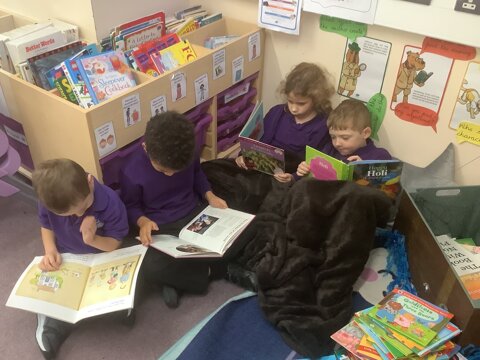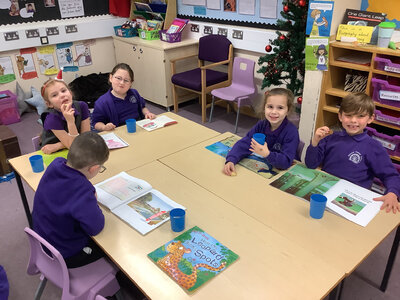Reading intent
We value the importance of Reading and wholeheartedly believe that:
“Reading is the gateway for children that makes all other learning possible.”
Barack Obama
Reading skills are taught in a systematic way in discrete Reading, Floppy’s Phonics and English sessions but are applied and practised across the whole curriculum.
Reading book scheme
We use the Oxford Reading Tree scheme which runs alongside Floppy’s Phonics. Children continue on the scheme until they reach Level 14, when they become free readers and, with the support of their teacher, choose age-appropriate texts.
Reading skills
In addition to the EYFS and National Curriculum, we use Twinkl’s Totally Pawsome Reading Pals to teach Reading skills. This ensures that the teaching of Reading is progressive and that children hear consistent language associated with the teaching of reading. Our pupils build upon their prior knowledge and skills as they move through school.
An introduction to the Totally Pawsome Reading Pals (Twinkl)
Key Stage 1: VIPRS
V – Vocabulary Victor
I – Inference Iggy
P – Predicting Pip
R – Rex Retriever
S – Sequencing Suki
Key Stage 2: VIPRSCA
V – Vocabulary Victor
I – Inference Iggy
P – Predicting Pip
R – Rex Retriever
S – Summarising Sheba
C – Cassie the Commentator
A - Arlo the Author
Wonder words
Reading Interventions
Children who are identified as needing ‘keep up’ time in reading are offered a programme of interventions to help them to develop their reading skills. This includes daily one-to-one reading with an adult, either group or individual Phonics interventions (depending on the level of need), additional story/shared book times and/or Project X Code (Oxford University Press).
English Hub and Somerset Literacy Network
We work closely with the English Hub and Somerset Literacy Network to support our professional development.
- All children at Millbrook have daily story/shared book sessions in their classes where, usually the teacher, reads aloud to the children.
- Our pupils are taught how to take part in ‘book talk’, discussing different aspects of texts and gaining knowledge of other children’s opinions and preferences. This can help to inspire children to read books that they might otherwise not have read.
- In English sessions, Key Stages focus on two different genres of texts each term, either fiction/poetry and a non-fiction text.
- Every class has a book corner with a range of genres and text-types in.
In addition to this, below is a short commentary of how our pupils learn to read in the different year groups:
EYFS
In our Early Years classes, our pupils are read to, read and talk about books on a daily basis. Our classrooms are rich in print and, wherever possible, there are books supporting provision. We teach a text-based curriculum and the knowledge and skills that our children learn are linked to texts at every opportunity.
Key Stage 1
In Year 1, reading is taught through short, whole-class inputs, focusing initially on decoding skills with a gradual introduction of the Reading Pals. In addition, they have English lessons with Reading objectives/skills focus. Year 1 have pleasure for reading’ time when they have the opportunity to choose their own texts to enjoy. They are given book talk prompts.
In Year 2 reading is taught through daily Guided Reading lessons as well as English lessons with Reading objectives/skills focus. Guided Reading sessions have a ‘Reading Pals’ skills focus. Each day there is a whole class input linked to that dog’s skill. Within the Guided Reading carousel there is an adult led reading activity, 1:1 reading, an independent reading task giving children the opportunity to apply their reading skills and a follow up activity based on the week’s focus skill. There is also a ‘pleasure for reading’ group who have the opportunity to choose their own texts to enjoy. They are encouraged to review books and are given ‘book talk’ prompts.
Key Stage 2
Reading in Key Stage 2 is taught in discrete lessons, four times a week. Three lessons have a ‘Reading Pals’ skills focus and one has a pleasure for reading, ‘book talk’ focus. Lessons are taught as a whole class and are either centred around a text or a Reading Explorers extract.
Home learning
- All children are given membership to Oxford Owl where they can access e-books at home that match their Reading level. Reception children are also able to access the Phonics books that are used in class to teach new GPCs. This also helps to create a good partnership between Reading, the pupil, parent and teacher.
- From Reception onwards, Children take school reading books home and are encouraged to read at least 5 times a week. We run parent Phonics and Reading sessions where we explain how we teach early Reading and Reading skills.
- Before Christmas, and again before the summer holidays, we provide each of our pupils with a brand new, age-appropriate text to take home and keep. This helps to foster a love of reading in our children and increases the number of books that they have access to at home.
Pleasure for Reading
- In 2023 we transformed our Library, moving it to a new location and adding 100s of beautiful new books. We have raised the profile of our Library and children have a weekly class library slot as well as the opportunity to visit the library during lunchtime one day a week. We have library monitors from Year 5 who work to recommend books to other children as well as keeping it tidy.
- Children are encouraged to earn ‘Reading Miles’ both individually and for their class. This incentive is linked to sharing books at home with an adult but children can also earn miles by recommending a book or by exploring books in different genres.
- Each year we have a high-profile World Book week to coincide with World Book day, The whole school are involved and read a different version of the same text.
- Postcards are sent home to inform parents/carers that their child has been Reading well.
- We run a book fair each year where parents and their children can come and buy books. As our school takes a proportion of each sale to spend on books, we are able to use this money to update our class book areas each year with new literature.
- We actively encourage book talk. Asking what a child is reading and how they are enjoying it is a normal part of day-to-day conversation at Millbrook.
- Our pupils go on an trips to the West Swindon Library and we provide information to parents how they can become members.
- Each summer we set a reading challenge to ensure that pupils remain avid readers throughout the holidays.
- We help organise, and take part in, reading competitions with the other schools in our LACT. Such competitions include the performance poetry competition. Children are given the opportunity to share their love of reading with other children who they don’t usually spend their time with.
- Where possible, we like to invite authors, illustrators and poets to visit the school. This helps to foster a love of reading in our pupils and aims to inspire and engage them to read a variety of text types. Such author visits include Taffy Thomas.
- We have Year 6 reading buddies who support our younger children with their reading.
- When children are listened to read individually by an adult, information is recorded on this in the class Reading folder.
- At Millbrook we ensure that our pupils’ Reading development is assessed accurately by considering both their comprehension and word reading skills and knowledge.
- In Key Stage 2, along with teacher professional judgment, children take termly Rising Stars reading assessments. Year 6 are assessed by SATs at the end of their time in Key Stage 2.
- Throughout Reception and Key Stage 1, Phonics assessments and teacher’s professional judgement are used to assess and plan for the learning of children.
- In EYFS, all practitioners have regular discussions about the progress and development of our pupils. Careful thought and planning is put into developing children’s next steps.
- In Key Stage 1, monitoring from Reading sessions is kept in a Reading folder. In Year 2, work from Guided Reading sessions is recorded in separate Reading books. Reading-focused work from English lessons is recorded in English/Topic books. Working walls provide information for current English focus skills and book areas contain relevant information relating to the Totally Pawsome Pals.
- In Key Stage 2, work from taught Reading sessions is recorded in separate Reading books. Reading-focused work from English lessons is recorded in the front of English books. Working walls provide information for current English focus skills and book areas contain relevant information relating to the Totally Pawsome Pals.
- By collecting and analysing our reading data, we are able to identify children who need ‘keep up’, provide extra challenge for children who are excelling and look for trends that help us to identify areas for celebrating and sharing and improving. We use this information to improve the planning and teaching of reading across the school.
Our pupils are
- Excited to read and listen to books being read to them.
- Eager to talk about the texts that they have read/are reading.
- Able to recommend books they have enjoyed.
- Making good progress with their reading.
- Reading a variety of different text types.
- Using and understanding the language around reading.
- Reading books that match their Phonics/ reading ability.
- Confidently applying the reading skills that they have learned in different contexts.
- Asking and answering questions about the books they read.
- Understanding more about the world because of what they read.


.jpg)
